|
By John Last | CBC News
from Canadian Broadcasting Corporation
Sunday, Nov 28, 2021
Church of Sweden apologizes, embarks on reconciliation with Indigenous Sámi people
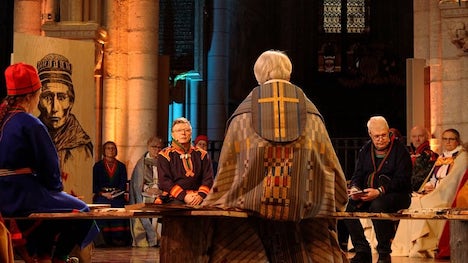 |
| At a special service in Uppsala Cathedral on Nov. 24, Archbishop Antje Jackelén, centre, of the Church of Sweden addresses a circle of Sámi leaders to apologize for her church’s past crimes against the Sámi, Indigenous people who live on parts of Sweden, Norway, Finland and northern Russia. (John Last/CBC) |
In Uppsala Cathedral, the heart of Swedish Christianity, Archbishop Antje Jackelén sat this week before a circle of Sámi leaders in traditional dress and the television cameras of Sweden's state broadcaster, listing the past crimes of her church.
"You have told us about forced Christianization and Swedish colonialism. Sámi culture was denied," Jackelén said, in Swedish. "Today, we acknowledge this and, on behalf of the Church of Sweden, I apologize."
Wednesday's apology service in Uppsala, the culmination of more than 30 years of discussions and advocacy, marked a major step forward for reconciliation in Sweden, where the Indigenous Sámi people continue to fight for self-determination and recognition of past wrongs committed by church and state.
Having studied the Canadian experience of reconciliation, church and Sámi figures alike emphasized that the apology must be followed by concrete actions, and came with no expectation of forgiveness.
"As we apologize to you today, we cannot determine how you will receive this apology. It is not our place to demand to know when a response will be given," Jackelén said in her speech.
"While we wait, we pray to God … that we do not repeat past mistakes."
As one of its commitments, the church pledged to acknowledge the importance of Sámi spirituality, and even incorporate it into Christian worship after centuries of exclusion and demonization.
Ingrid Inga, the chair of the church's internal Sámi Council, called it "the starting point of a new relationship between the Church of Sweden and the Sámi people."
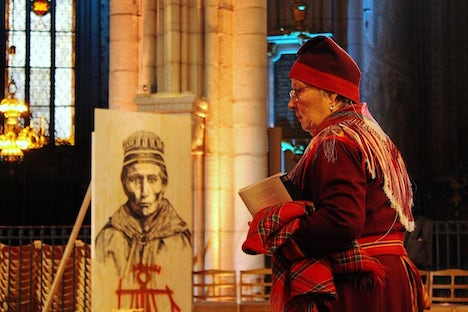 |
| Ingrid Inga, the chair of the church’s internal Sámi Council, called the apology 'the starting point of a new relationship between the Church of Sweden and the Sámi people.' (John Last/CBC) |
Crimes of assimilation
The Sámi are indigenous to the vast forests and tundra of Arctic Europe, traditionally herding reindeer, hunting and fishing across Norway, Sweden, Finland and parts of northern Russia. For centuries, they have been divided by the borders of those countries, which all embarked on differing programs of forced assimilation.
Though the earliest Christian missionaries are believed to have visited Sápmi, the traditional territory of the Sámi, in the 11th century, Sámi say the church's process of forced Christianization truly began some 500 years later, when the Reformation unified church and state.
In an 1,100-page anthology produced for the Church of Sweden in 2019 — seen as an essential precondition to the apology — historians documented the way the church supported the state in the process of erasing and suppressing Sámi identity.
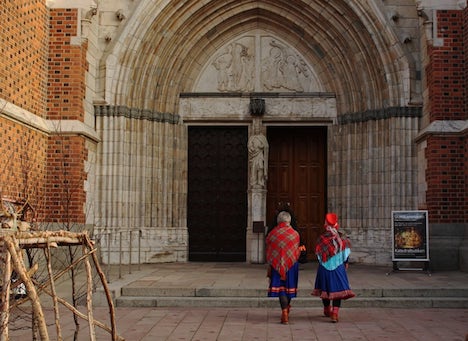 |
| Sami delegates attending the apology service enter Uppsala Cathedral. (John Last/CBC) |
Christian preachers condemned Sámi religion as devil worship, banning the joik, a form of spiritual singing used by noaidi, or Sámi shamans, to communicate with the spirit world.
The 17th century saw a wave of puritanical witch trials, in which Swedish church and state authorities waged an intense campaign against Sámi worship, which they branded as sorcery. One noaidi, Lars Nilsson, was burned at the stake, and many others were tried for witchcraft.
In pursuit of converts, the Swedish church produced the first writing in the Sámi languages, in translated bibles. But by the 20th century, it was actively suppressing the Sámi languages in church-run schools.
Reindeer herders were segregated to subpar "nomad schools," which sought to "protect" them from civilization as an "inferior race."
As in Canada, these church-run schools became theatres for humiliating scientific experiments and clerical abuse. Racial biologists also conspired with bishops to dig up the remains of Sámi children and elders — many of which still sit in museum collections across Europe.
Other Sámi, deemed not sufficiently nomadic by Swedish authorities, were forced to assimilate, driving divisions in the community that exist to this day.
Christianity an 'Indigenous religion'
Yet today, many Sámi are still devoutly Christian. A 19th-century revival movement produced an Indigenous form of Lutheranism that transformed communities damaged by the suppression of traditional activities.
"Many Sámi think that Christianity is their Indigenous religion, because the Sámi have for centuries been dealing with Christianity," said Helga West, a Sámi theologian who studies the reconciliation processes underway in the three Nordic countries. (Her Sámi name is Biennaš-Jon Jovnna Piera Helga.)
"Yet… there are many Sámi who don't want to be involved with these churches at all."
Thomas Colbengtson, originally from Tärnaby, was raised in the Lutheran Church and attended a nomad school. He says the experience left him with a "mixed feeling" about his own identity.
"In a way, you've got double guilt — guilt [for] being Sámi, guilt [for] being Swedish, guilt [for] perhaps not practising Christian religion, guilt [for] being Christian…. That's the sensitive thing to talk about."
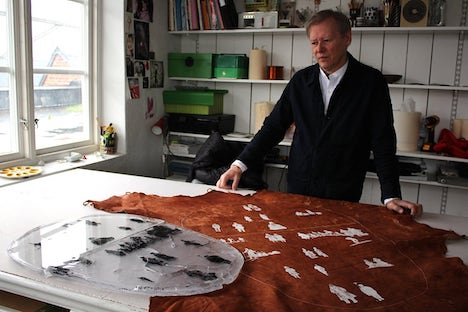 |
| Sámi artist Tomas Colbengtson stands in his Stockholm studio with artwork based on a traditional noaidi drum. It will be exhibited inside a Swedish church. (John Last/CBC) |
In a former glass factory in the suburbs of Stockholm, Colbengtson wrestles with that tension as a Sámi artist. His most recent work, based on a noaidi drum, will be displayed near the altar of the Swedish church.
"Part of it is provocation," he said, "and … part is to visualize Sámi presence in the area, and Sámi culture that [they have] tried to erase."
Spiritual destruction — and renewal
Guided by the Canadian truth and reconciliation process, the church has largely focused on documenting historical wrongs. But West says it has not yet come to terms with how it has forever transformed Sámi spirituality.
"Christianity in general brought this hierarchical and linear view of the world that was very different from the Sámi cosmic vision, that was pluralistic," she said. "They were forced to think differently of the world, of their ancestors, of their practices, that were labelled as pagan and backward."
Some Christian Sámi have managed to reconcile these identities within themselves. Nilla and Nik Märak, two sisters from Jokkmokk, learned from their father, Johan, a renowned Sámi priest, who broke barriers by bringing joiking into the church for the first time.
"He used to say, 'God was with the Sámi before the church,'" Nik said with a laugh.
"He knew that by … being a minister in the church, and bringing the two worlds together, he could, just by his presence, actually go quite a long way [toward] reconciliation," Nilla said.
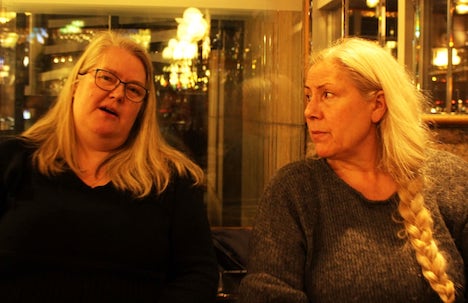 |
| Nilla, left, and Nik Märak, sisters and Sámi cultural advocates, say their father, a renowned Sámi Christian priest, showed that embracing both Christianity and Sámi spirituality is possible. (John Last/CBC) |
For Nilla, who handed out communion wafers at Wednesday's service in Uppsala, the church's recognition of past wrongs is an important step in and of itself.
"A huge part of reconciliation, and the healing that will come, we hope … is to realize that there has been damage done," she said. "The Sámi religion has been damaged, and the Sámi soul has been damaged."
Wednesday's service included eight concrete commitments to reverse the historic erasure of Sámi culture, meant to counter early perceptions among Sámi that public apologies, like those in Canada, would be merely performative.
Among them are pledges to preach in the Sámi language, educate congregations about past crimes and make Sámi traditions a more visible part of Christian worship.
"I hope that the Sámi people really trust the Church of Sweden, that it's for real, that we want Sámi spirituality as part of the church," said Bishop Åsa Nyström, whose Luleå diocese covers the northernmost third of Sweden and includes many Sámi communities. "It is so important the Sámi people can have priests and deacons … from their own people."
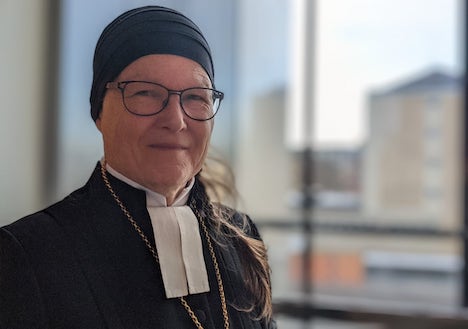 |
| 'I hope that the Sámi people really trust the Church of Sweden,' says Bishop Åsa Nyström, whose diocese in Luleå includes Sámi communities. (John Last/CBC) |
State absent
Some say there is still more the church could do. Northern dioceses like Nyström's derive income from vast forests they manage. But Åsa Larsson Blind, vice-president of the transnational Saami Council, says they do not pursue international certifications that would require co-management with the Sámi.
To critics, the greatest shortcoming of Wednesday's church apology may be that the Swedish government was nowhere to be seen.
"It's only the church doing the work," said Nilla Märak. "The Swedish government is doing nothing. They're barely even recognizing that there is a need for a reconciliation process."
Many of the crimes documented by the church were committed in service of a colonizing Swedish state, which sought to push Sámi people off profitable land and divide them with borders.
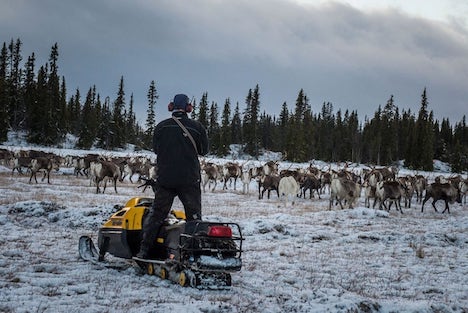 |
| A Sámi man uses his snowmobile to herd reindeer near the Swedish village of Dikanaess, about 800 kilometres northwest of Stockholm. (Jonathan Nackstrand/AFP via Getty Images) |
Yet the state's own reconciliation process has barely begun. First discussed more than 15 years ago, the Swedish government only this month announced a truth commission, which will be focused primarily on fact-finding over its four-year mandate.
"It's very, very important, but it isn't a reconciliation process," said Nyström.
Meanwhile, the Swedish government continues to fight Sámi reindeer herders in court for the right to build mines and power plants on their lands. It has refused to ratify international conventions recognizing the rights of Indigenous people.
A landmark Supreme Court decision in the Sámi village of Girjas appears to have established a duty to consult with Sámi people. But the government continues to interpret it narrowly.
"They are dodging the whole issue," said Larsson Blind. "And by not addressing the issues, they are letting business as usual … just go on."
As part of its evidence in court, the government's representative read an 1884 statement that said Sámi herders live "on a less cultured level" and must "give way to the more civilized people."
Two ministries within the Swedish government responsible for Sámi issues declined CBC requests for comment.
Making an ally of the church
Many of those present at Wednesday's service hope the apology will be a turning point for the church, making it a crucial ally in the push for restitution from the government.
"I think that the church having the platform and the voice in Sweden that they have, they can actually play a huge part in this," said Larsson Blind.
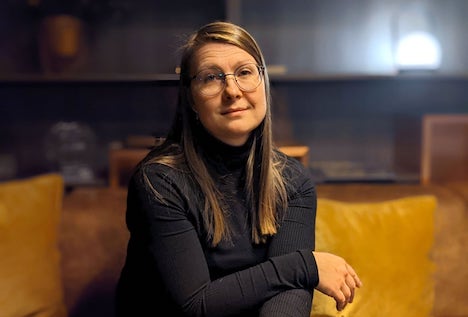 |
| Asa Larsson Blind, the vice-president of the transnational Sámi Council, says the apology is an important step, but must be followed by concrete actions. (John Last/CBC) |
Within the church, meanwhile, the long and difficult work begins to regain trust with Sámi Christians and their communities.
"In some time … the [Sámi people may] take this apology and forgive the church," said Inga, the Sámi church council's chair. "But this is not the right time for that."
Source URL
|
 Print This Print This

|

